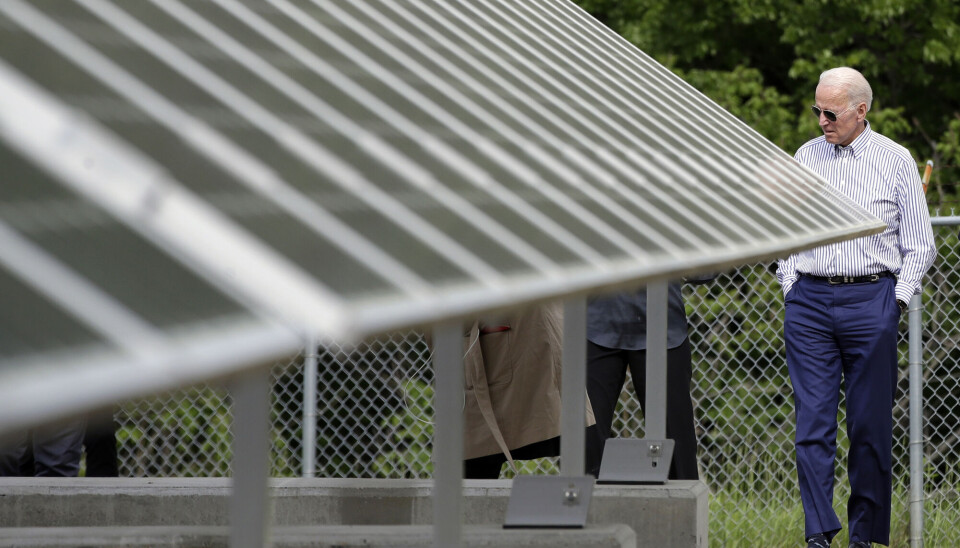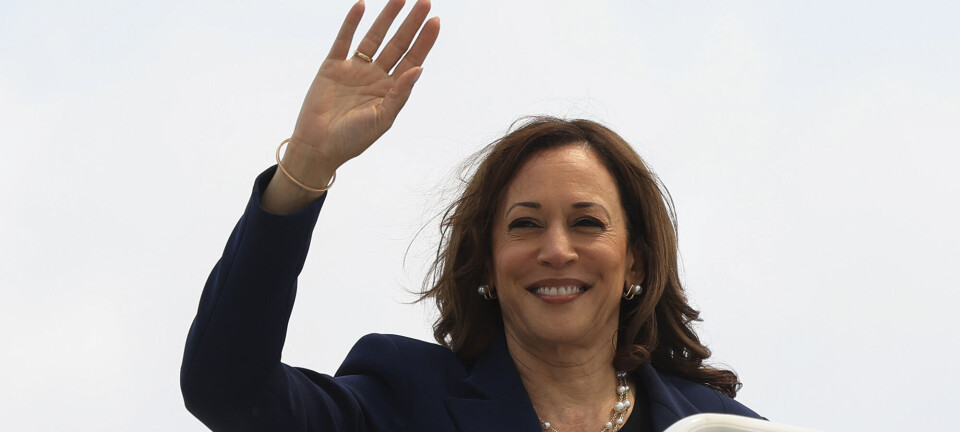
Biden implemented a historic climate law in the USA – could Trump undo it?
In 2022, Joe Biden passed historic climate legislation. The USA adopted the most ambitious climate policy in its history. Will Donald Trump dismantle Biden's ambitious climate laws if he wins the election? Researchers are divided.
The USA, led by Joe Biden, aims to cut the country's greenhouse gas emissions by 50 to 52 per cent by 2030.
Economic models indicate that this goal could almost be reached with the measures Americans have initiated.

"The USA can achieve up to a 43 per cent reduction in emissions by 2030 if this policy is fully implemented," says Guri Bang.
She is a professor at the Norwegian University of Life Sciences (NMBU) and a specialist in US climate and energy policy.
Trump: 'Green new scam'
If Trump wins the election, he promises his voters to dismantle all climate policies Biden has established. He calls it a 'green new scam.'
He believes that investing in renewable energy is a waste of taxpayers' money.
"Drill, baby, drill," is something Trump often repeats at his campaign rallies.
He also signals that he will remove all climate measures and withdraw the USA from international climate cooperation.
Not such a big difference
But according to an article in the The Economist, green subsidies might survive if Donald Trump becomes president.
And the major oil companies – 'Big Oil' – will endure even if Kamala Harris wins the election.
Roberto J. Garcia is an associate professor at NMBU's School of Economics and Business.
Like the experts who commented in The Economist, he does not believe there will be significant differences between Harris and Trump in climate policy.
Congress as a barrier
"I believe both Congress and the US Supreme Court will limit much of what Trump says he will do if he becomes president. This is despite the fact that Trump would now have people around him who are more competent and more ideological than he had during his previous term," Garcia recently said at a seminar organised by NMBU.
He also argues that it is primarily the red states, where most voters support Republicans, that have benefited from the USA's new major investments in green energy.
"Therefore, there will likely be significant local opposition to tearing down the new climate legislation," Garcia believes.
Going in the opposite direction
Guri Bang believes that if Trump becomes the new president of the USA, it will have negative effects on climate policy.
"The USA is currently on the right track with climate policy. But Trump has a political platform that goes in the exact opposite direction of what we've seen under Biden. These shifts back and forth in climate policy make it less stable and effective," she says.
Bang believes that Donald Trump may be able to push through much more of his policy this time than when he was president before.
"He's better prepared and has a team of advisers who are more organised," she says.
Difficult to remove act
At the same time, she also emphasises that it will be difficult for Trump to remove the new climate act – the Inflation Reduction Act (IRA).
"This is an act that has been passed by Congress. To change it, a new majority would be needed, which is difficult in a highly politically polarised context. Moreover, the IRA provides tax benefits and subsidies that may be unpopular to remove," says Bang.
Still, she believes it is hard to imagine that the outcome of the election will not affect climate policy.
Low-income groups prioritised
The IRA contains only incentives and no penalties, Bang explains.
"The incentives come in the form of substantial tax cuts and subsidies for green technology development and implementation," she says.
It also includes subsidies for the general public, so that they can make climate-friendly choices in their daily lives, such as buying an electric car and switching from gas heating to a heat pump at home.
A full 40 per cent of the IRA fund is reserved for low-income families.
Those with the lowest income can receive up to 7,500 USD in support to buy an electric car.
Effective political strategy
Guri Bang credits the Biden administration with skillfully navigating the political process to pass the IRA in 2022. They used the budget process and special voting procedures in Congress to make it possible.
"This was a major breakthrough for American climate policy. A total of 369 billion dollars was set aside to invest in green transition," says Bang.
Biden initially proposed a massive package of tax cuts and subsidies to boost the economy after the Covid-19 crisis. He worked persistently to push it through Congress after taking office in 2021.
Faced resistance
However, the president enountered internal resistance within the Democratic Party. In the end, Democrats managed to agree on a scaled-down version, Bang explains.
"The climate act package also includes some incentive arrangements for oil and gas. These were added to secure the vote of Senator Joe Manchin from West Virginia for the IRA," she says.
This compromise enabled Democrats to reach consensus among all their members in Congress. They had just enough votes, and with the tie-breaking vote from Vice President Kamala Harris, the act was passed.
No Republicans voted for the IRA, only Democrats.
More positive towards renewable energy
There are clear differences between Democrats and Republicans on climate policy, especially regarding carbon pricing measures like carbon tax or emissions trading, Bang explains.
"The divide between Democrats and Republicans is narrower when it comes to renewable energy, although Republicans disagree on how much the government should subsidise renewable technology development," she says.
According to the climate expert, it is far from certain that Donald Trump, as president, would receive full Republican support to dismantle the IRA.
Economic growth and new jobs
Many may oppose eliminating subsidies for the start-up of new electric vehicle and battery factories in Republican-led states that benefit from Biden's industrial policies, experiencing economic growth and new jobs.
The professor at NMBU is more concerned about the part of the legislation that deals with fair transition.
She believes the emphasis on promoting a green transition for low-income families and regions could be at risk under a new Trump administration.
Harris' limited focus on climate
Kamala Harris cast the deciding vote when Congress voted on the IRA.
This has led many on the political left in the USA to hope she will pursue an even stronger climate agenda if she becomes the next president.
However, Harris has not spoken much about climate in this election campaign, Bang points out.
One reason is that climate issues rank low on the list of concerns for most American voters at the moment.
"In this election campaign, rising prices, immigration, and abortion have been at the top of the agenda. Climate has taken a back seat," says Bang.
Impact of the election
The Biden administration has been a driving force for stronger and more ambitious climate policy in the USA. It has also been an active participant in international climate cooperation, Bang states.
"With Trump as president, there would be a big difference. His political agenda is to dismantle as much climate policy as possible and withdraw the USA from the Paris Agreement and other international climate agreements," she says.
If Trump is elected, the USA will lose momentum in climate policy, especially if there is a Republican majority in both the House of Representatives and the Senate after the election, Bang believes.
World's second-largest emitter
Guri Bang disagrees with Roberto J. Garcia's assessment that the election outcome will have little effect on climate policy.
Even if Trump only removes parts of the IRA plan, the USA will still achieve fewer emissions cuts than if Harris wins. Progress in the transition to more renewable energy would be hampered, she believes.
"For the climate, this matters because the USA is the world's second-largest emitter of greenhouse gases. The UN's climate panel indicates that the transition to more green energy must happen quickly if we are to have any chance of reaching the Paris goal of a maximum of 1.5 degrees of global warming," says Bang.
———
Translated by Alette Bjordal Gjellesvik
Read the Norwegian version of this article on forskning.no
Related content:

Subscribe to our newsletter
The latest news from Science Norway, sent twice a week and completely free.





































